Delivering Beverages: Unlocking New Revenue Channels through Alcohol Distribution
In today’s fast-paced world, the desire for convenience has turned into a key determinant in consumer preferences. Businesses across various industries are continuously seeking creative solutions to meet their customers’ needs, and one area that has seen remarkable development is the service of delivering alcohol. As more people lean towards the comfort of home and the need for smooth transactions, the ability to bring alcoholic drinks straight to their homes presents an invigorating chance for businesses to tap into new revenue streams.
The phenomenon of alcohol delivery is beyond just a temporary trend; it reflects a broader shift in consumer behavior. Thanks to advancements in technology and mobile applications, customers now expect quick fulfillment, even when it comes to their favorite beverages. For businesses ready to adjust, providing a liquor delivery service can not just elevate customer contentment but also create pathways to a dynamic market that is driven by convenience and accessibility. In this article, we will explore how your business can leverage this growing trend and effectively establish an alcohol delivery system that connects with contemporary customers.
The Rise of Alcohol Delivery Services
The alcohol delivery service industry has seen a impressive surge in demand over the recent years. This growth can be linked to evolving consumer habits, technological advancements, and the simplicity that these services provide. As people increasingly seek ways to enjoy their favorite beverages from the convenience of their homes, businesses that provide alcohol delivery are tapping into a new market that demands this level of convenience.
Moreover, the COVID-19 pandemic acted as a catalyst for the rise of alcohol delivery services. With bars and restaurants facing restrictions, many turned to delivery as a alternative. This shift not only helped businesses endure but also introduced a new consumer behavior that prioritizes the ease of ordering alcohol online. As restrictions eased, many consumers kept favoring the convenience of delivery, driving more businesses to implement this model.

Currently, an increasing number of startups and established companies are participating in the alcohol delivery market, offering different options from local craft brews to premium wines and spirits. This diverse range of selections attracts a larger crowd and caters to diverse tastes, presenting an thrilling opportunity for businesses looking to grow their revenue streams. As the trend continues to evolve, the alcohol delivery service sector is expected to stay a significant player in the overall beverage market.
Advantages for Businesses and Consumers
The debut of liquor delivery services brings a myriad of advantages to companies looking to enhance their income sources. By launching an liquor delivery service, venues such as restaurants, bars, and retail shops can reach a broader audience. This not only increases sales but also provides an opportunity to cater to customers who prefer the ease of having their preferred drinks delivered straight to their doors. As customer preferences change towards more e-commerce experiences, companies that adapt to this trend position themselves for expansion and increased customer loyalty.
From the customer standpoint, liquor delivery services provide exceptional convenience. Customers can order their desired drinks from the comfort of their homes, avoiding the need to travel to a shop or bar. This is especially appealing during busy times, such as festive seasons or occasions, when people are often looking for ways to simplify their plans. Additionally, many delivery services offer curated selections and personalized recommendations, enhancing the consumer experience by making it easier for consumers to find new products they may not have thought of.
In addition, alcohol delivery promotes sensible consumption through features like age verification and shipment tracking. Consumers appreciate the reassurance that their deliveries are handled with care and compliance to legal regulations. This emphasis on responsibility not only builds trust between consumers and companies but also contributes to a more positive image for the alcohol industry as a whole. As both businesses and customers benefit from the ease and availability of liquor delivery, it is clear that this service is becoming an essential part of contemporary commerce.
Steering Through Legal Frameworks and Adherence
Venturing Into the alcohol shipping market demands a comprehensive awareness of the legal landscape. Each locality and locality has varied laws governing the selling and delivery of liquor. Organizations must familiarize with these regulations, including licensure, age verification, and shipping limits. Adhering with these laws is vital not only to steer clear of fines but also to create a reputable brand that consumers can trust.
In addition to state regulations, businesses should also take into account federal regulations that impact alcohol delivery services. The TTB sets rules pertaining to the transport across state lines of liquor, which can change considerably based on the type of alcohol being sold. To efficiently navigate wine delivery toronto , businesses may opt to talk to attorneys or professional organizations that concentrate in liquor delivery to guarantee full adherence.
Finally, putting in place effective internal policies and education for employees is necessary. This includes creating definite protocols for checking customer age, ensuring proper labeling of beverage containers, and being aware of delivery regulations within the areas they serve. By investing in regulatory compliance, organizations can not only avoid potential law-related problems but also build a responsible and trustworthy service that can improve client retention and fulfillment.